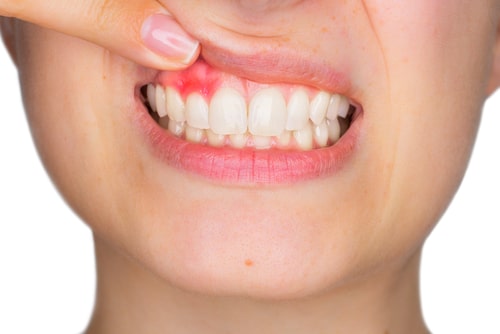
As you brush your teeth, you might notice a bit of redness around your gums. It can be tempting to ignore the blood, but according to the National Library of Medicine, bleeding gums is an early sign of gum disease. Gingivitis, a mild form of gum disease, may require treatment and improved oral hygiene to help eliminate it. If left untreated, bleeding gums and gingivitis can lead to a more serious form of gum disease called periodontitis. The bleeding is caused by inflammation in the gums, typically caused by plaque build-up or forceful brushing.
If you notice some blood when you brush or floss, it is important that you make an appointment to see a dentist. There are a few things you can do to stop the bleeding on your own.
- Eat Healthier: Improving your diet is not only good for your physical health but can also improve your oral health and stopping bleeding gums. When you eat a diet full of whole foods, like vegetables and fruits, it provides your gums with the nutrients they need. A nutritionally deficient diet, full of sugary foods and drinks and refined bread, you’re not giving your gums the nutrition they need to stay healthy and intact. Often, those who don’t have gingivitis, bleeding gums may be caused by bleeding disorders, leukemia, vitamin K deficiency, hormonal changes, scurvy, or using blood thinners.
- Change Up Your Dental Care: Taking good care of your mouth at home is one of the most important things to do when improving your gum bleeding. Regularly brushing and flossing removes bacteria, which is one of the main cases of inflammation in the gums. When you use the right devices and brush techniques, you can start to improve the overall health of your mouth and reverse early gum disease. For example, using a medium- or firm-bristled toothbrush can damage your gums when pressure is applied while you brush. It is one of the main reasons dentists recommend choosing a soft-bristled brush. Try to brush gently, using short strokes, in order to effectively brush the teeth and gum line. You should also make sure to floss every day. Flossing is one of the most important ways to help combat bleeding gums and maintain good oral health. Floss removes plaque and food particles that can get under the gum line and lead to bleeding gums and decay.
- Manage Your Stress: Nowadays, it is common for people to always be on the go or always be up against a deadline. Unfortunately, this large amount of stress in life can cause gums to bleed. High levels of stress can affect your oral health because stress increases inflammation in your body, raising the likelihood that your gums will bleed. Stress can also reduce your immune system’s functionality and make it more difficult for your body to handle infection and to heal.
- Stop the Bad Habits: According to the American Academy of Periodontology, smoking is terrible for your health. It not only increases your risk of developing cancers and heart disease, but it also aids in the development of gum disease. The toxins in tobacco smoke make it hard for your gums to get the nutrition that they need and can lead to inflammation. Quitting can be tough, but it’s one of the most important things to do if you want to protect your oral and overall health.
- Sharing Isn’t Caring: Did you know that gum disease and bleeding gums are contagious? If you have a partner who has a lot of bacteria in their mouth, there is a likely chance that you are increasing your risk for gum problems. While it may be hard to avoid kissing, trying to cut back on sharing anything the person uses with their mouth, from toothbrushes to water glasses.
Seeing your dentist for an examination and teeth cleaning on a regular basis is the number one way to put an end to bleeding gums and helping to detect and treat gum disease before it becomes a major issue. If it’s been a while since you’ve seen your dentist. So, if you’ve noticed a bit of blood when you brush and floss, but you’ve been holding off on making an appointment, make an appointment today. The dentists at Foothill Dental Care in Livermore are able to diagnose and plan the necessary treatment plan that will help improve the health of your mouth significantly. Give us a call today at (925) 961-5484
